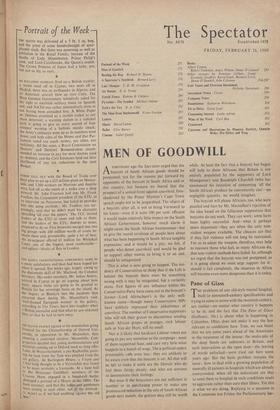MEN OF GOODWILL
AFORTNIGHT ago the Spectator urged that the boycott of South African goods should be postponed; not for the reasons put forward by opponents of the boycott in South Africa and in this country, but because we feared that the prospect of a united front against apartheid, fore- shadowed by the Prime Minister's Cape Town speech ought not to be jeopardised. The object of a boycott, after all, is not to bring Verwoerd to his knees—even if it were 100 per cent. efficient it would make relatively littie impact on the South African Government, however much alarm it might cause the South African businessman—but to give the moral revulsion of people here about what has been happening in South Africa tangible expression; and it would be a pity, we felt, if people who detest apartheid, and would be glad to support other moves to bring it to an end. should be antagonised.
This is what is now going to happen. The ten- dency of Conservatives to think that if the Left is behind the boycott there must be something wrong with it may be misguided, but it certainly exists. Few figures of any influence within the Conservative Party have come out in the boycott's favour—Lord Altrincham's is the only well- known name—though many Conservative MPs have publicly expressed their abhorrence of apartheid. The number of Conservative supporters who will tell their grocer to discontinue sending South African grapes or oranges, rock lobster tails or Van der Hum, will be small.
Nor is it likely that hardcore Labour voters are going to pay any attention to the campaign : most of them supported Suez, and care very little what happens to a bunch of wogs. The a-political centre presumably ca+e even less: they are unlikely to be aware even that the boycott is on. All that will be left to make it work are the liberals who do feel these things deeply, and who are anxious to demonstrate their feelings.
But even if the boycotters are not sufficient in number or in purchasing power to make any pronounced reduction in the sale of South African goods next month, the gesture may still be worth while. At least the fact that a boycott has begun will help to show Africans that Britain is not entirely populated by the supporters of Lord Montgomery and Randolph Churchill (who has announced his intention of consuming 'all the South African produce he conveniently can'—no negligible quantity, we would imagine).
The boycott will please Africans, too, who were puzzled and hurt by Mr. Macmillan's rejection of the idea based on the fallacious supposition that boycotts do not work. They can work; some have been highly successful. And—what is perhaps more important—they are often the only non- violent weapon available. The chances are that if they fail violence will not long be restrained. For us to adopt the weapon, therefore, may help to reassure those who feel, as many Africans do, that non-violent methods have failed. So, although we regret that the boycott was not postponed, as ' it is going ahead we must urge support for it : should it fail completely, the situation in Africa will become even more dangerous than it is today.


































 Previous page
Previous page